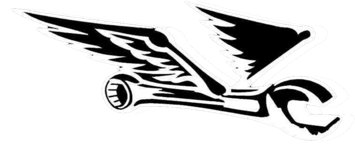How To Start Building Your Tools
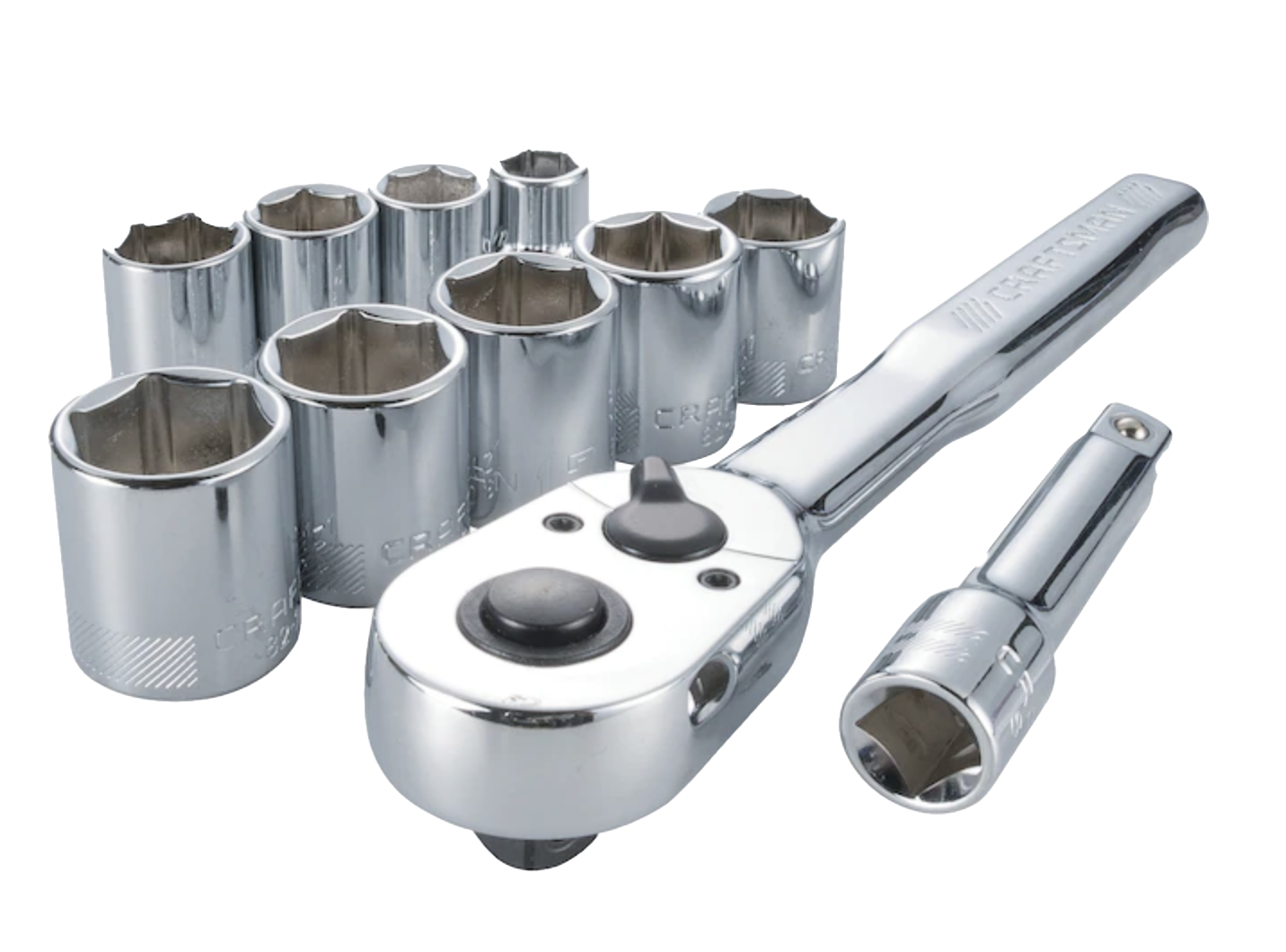
-
Table of Contents
The Basic Mechanic Tools to Start With
Starting out as a mechanic can be a daunting task. You need to have the right tools to get the job done. Here is a list of the basic mechanic tools you need to get started. Quality tools are important for longevity and personal safety. But if you are just starting, having even a cheap tool is often better than no tool at all. Get what you can afford when you can and don’t be afraid to let your mechanic friends know that you are trying to put together a basic tool set.
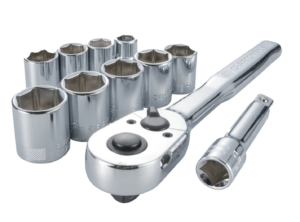 1. Socket Set & Ratchet: A socket set is a must-have for any mechanic. It includes a variety of sockets sizes to loosen and tighten nuts and bolts. Ultimately you will want both American & Metric sockets but you can start with one or the other depending on whether you plan to work on American or foreign vehicles. Today even most American vehicles are being manufactured with Metric hardware so unless you plan to start wrenching on Corvettes or Harleys right away, it is probably better to start with a metric set. The most common sockets sets come in 1/4″ Drive, 3/8″ Drive, and 1/2″ Drive. The drive size is referring to the to the diameter of its anvil or drive square—the place you attach the socket. The larger drives can handle more torque but are physically larger and hence more costly. On the flip side, larger drive sockets and ratchets may not be the right tool for those tight places. The 3/8″ Drive is a nice middle of the ground place to start.
1. Socket Set & Ratchet: A socket set is a must-have for any mechanic. It includes a variety of sockets sizes to loosen and tighten nuts and bolts. Ultimately you will want both American & Metric sockets but you can start with one or the other depending on whether you plan to work on American or foreign vehicles. Today even most American vehicles are being manufactured with Metric hardware so unless you plan to start wrenching on Corvettes or Harleys right away, it is probably better to start with a metric set. The most common sockets sets come in 1/4″ Drive, 3/8″ Drive, and 1/2″ Drive. The drive size is referring to the to the diameter of its anvil or drive square—the place you attach the socket. The larger drives can handle more torque but are physically larger and hence more costly. On the flip side, larger drive sockets and ratchets may not be the right tool for those tight places. The 3/8″ Drive is a nice middle of the ground place to start.
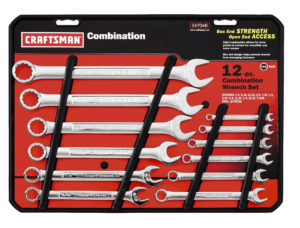 2. Wrench Set: A wrench set is used to loosen and tighten nuts and bolts. Wrenches come in different sizes and shapes… open end, box end, combination, ratcheting, metric, American. Again what you choose depends on what you plan to wrench on. My suggestion is start with a metric combination set. The most useful metric sizes a new mechanic needs are 10mm, 12mm, 13mm, 15mm. The most useful American sizes are 5/16″, 7/16″, 3/8″, 1/2″, 9/16″.
2. Wrench Set: A wrench set is used to loosen and tighten nuts and bolts. Wrenches come in different sizes and shapes… open end, box end, combination, ratcheting, metric, American. Again what you choose depends on what you plan to wrench on. My suggestion is start with a metric combination set. The most useful metric sizes a new mechanic needs are 10mm, 12mm, 13mm, 15mm. The most useful American sizes are 5/16″, 7/16″, 3/8″, 1/2″, 9/16″.
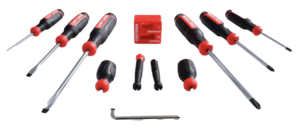 3. Screwdrivers: Screwdrivers are used to drive screws into and out. They come in a variety of sizes and shapes, so make sure you have a variety for the job. It is recommended to buy a variety set that includes both long, short, and stubby phillips head, and standard head. Screwdrivers that have a magnetic tip are useful to keep metal screws attached and also can be useful for retrieving dropped fasteners.
3. Screwdrivers: Screwdrivers are used to drive screws into and out. They come in a variety of sizes and shapes, so make sure you have a variety for the job. It is recommended to buy a variety set that includes both long, short, and stubby phillips head, and standard head. Screwdrivers that have a magnetic tip are useful to keep metal screws attached and also can be useful for retrieving dropped fasteners.
4. Pliers: Pliers are essential for gripping and manipulating small parts. They come in a variety of shapes and sizes, so make sure you have the right ones for the job.
5. Adjustable Wrench: Also called a Crescent Wrench, which is the brand that made these wrenches well known. An adjustable wrench is important because it’s a flexible tool for both metric and American sizes and can often accommodate very large nuts/bolts for which you may not have a socket or wrench for.
4. Hammer: A hammer is used to drive nails and other fasteners into materials. It is also used to loosen and tighten nuts and bolts.
6. Flashlight: A flashlight is essential for working in dark areas. It is also useful for inspecting parts and components.
7. Funnel: A funnel is used to transfer liquids from one container to another and avoid spilling. It is useful for adding oil and other fluids to vehicles.
8. Oil Filter Wrench: An oil filter wrench is used to remove and install oil filters. It is essential for performing oil changes. These come in a variety of styles and sizes. Start with size needed for your vehicle and add additional sizes as you begin to do more.
9. Hex Wrenches: A hex wrench is commonly used for the bolts holding down plastic engine covers, brakes, seat belt assemblies, socket cap screws, etc.
10. Vise Grips: These are pliers that have an adjustable mouth and are locking.
11. Breaker Bar: A breaker bar is used to give additional leverage to open and remove stuck fasteners.
These are the basic mechanic tools you need to get started. With these tools, you can tackle a variety of jobs and repairs. Good luck and happy wrenching!
Tool Storage for Longevity and Ease of Use
Keep your tools organized and easily accessible. Tool storage is essential for any workshop or garage, and it can make a huge difference in the longevity and ease of use of your tools. Having your tools organized will make it easier to find the right tool when you need it. It will always help you keep track of your tools from getting lost or stolen.
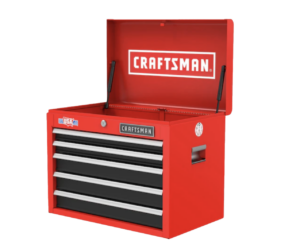 The first step in creating an effective tool storage system is to determine what type of storage is best. Wall-mounted systems are great for keeping tools off the floor and out of the way, while mobile tool chests are ideal for those who need to move their tools around. If you have a lot of tools, consider investing in a tool cabinet or a rolling tool cart.
The first step in creating an effective tool storage system is to determine what type of storage is best. Wall-mounted systems are great for keeping tools off the floor and out of the way, while mobile tool chests are ideal for those who need to move their tools around. If you have a lot of tools, consider investing in a tool cabinet or a rolling tool cart.
Once you’ve decided on the type of storage you need, it’s time to start organizing. Label each drawer or shelf with the type of tool it contains, and use dividers or bins to keep small items from getting lost. If you’re using a wall-mounted system, consider using pegboard or slatwall to hang tools and accessories.
Make sure you’re using the right tools for the job. Invest in quality tools that are designed to last, and take the time to properly maintain them. Clean and oil your tools regularly, and store them in a dry, cool place. Having quality tools less likely to break is important for your own safety. You can’t put a price on a lost eye from a cheap socket breaking and flying into your eye.
By taking the time to create an effective tool storage system, you’ll ensure that your tools are organized, accessible, and in good condition for years to come. With the right storage system, you’ll be able to work more efficiently and enjoy your tools for a long time.
Choosing Quality Tools for Your Toolbox
Having the right tools in your toolbox is essential for any job. Quality tools can make the difference between a job done right and a job done wrong. When it comes to choosing quality tools for your toolbox, there are a few things to consider.
First, consider the type of job you will be doing. Different jobs require different tools, so make sure you have the right tools for the job. For example, if you are doing carpentry work, you will need a saw, hammer, drill, and other carpentry tools. If you are doing plumbing work, you will need a wrench, pipe cutter, and other plumbing tools.
Second, consider the quality of the tools. Quality tools are made from high-grade materials and are designed to last. Look for tools that are made from durable materials such as stainless steel or titanium. Also, look for tools that have a good warranty. This will ensure that you are covered if something goes wrong with the tool.
Third, consider the price. Quality tools can be expensive, but they are worth the investment. Look for tools that are reasonably priced and that will last for years.
Finally, consider the brand. Different brands offer different levels of quality. Do some research to find out which brands are known for making quality tools.
Choosing quality tools for your toolbox is an important decision. Quality tools will make your job easier and help you get the job done right. Take the time to research the different types of tools available and find the ones that are right for you. With the right tools in your toolbox, you can tackle any job with confidence.
How to Expand Your Collection of Tools
Having the right tools for the job can make all the difference in the world. Whether you’re a professional tradesperson or a DIY enthusiast, having the right tools can make your work easier, faster, and more enjoyable. But how do you expand your collection of tools? Here are some tips to help you get started.
1. Research the Tools You Need: Before you start buying tools, take some time to research the tools you need for the job. Look at reviews, compare prices, and read up on the features of different tools. This will help you make an informed decision about which tools are best for your needs.
2. Set a Budget: Once you’ve done your research, set a budget for your tool purchases. This will help you stay within your means and ensure that you don’t overspend. A good method is to put a budgeted amount of money from each paycheck towards your tools. Depending on how much you can afford, you might be able to get a new tool each paycheck, or you may need to save up multiple paychecks to buy the tools you want. The important thing is to make an effort to budget some money towards expanding your tools.
3. Buy Quality Tools: Quality tools are worth the investment. Look for tools that are made from durable materials and have a good warranty. This will ensure that your tools will last for years to come.
4. Buy Used Tools: If you’re on a tight budget, consider buying used tools. You can often find quality used tools at garage sales, flea markets, and online. Just make sure to inspect the tools before you buy them to make sure they’re in good condition.
5. Ask for Recommendations: Ask your friends and family for recommendations on tools. They may be able to point you in the right direction and help you find the best tools for your needs.
6. Join a Tool Club: Many cities have tool clubs where members can borrow tools from each other. This is a great way to expand your collection of tools without having to buy them.
By following these tips, you can easily expand your collection of tools and make sure you have the right tools for the job. With the right tools, you’ll be able to tackle any project with ease. The following are other special tools you might want to consider:
- Floor Jack
- Jack Stands
- Vehicle Ramps
- Oil Catch Pan
- Torx bit set
- Universal Joint
- Ratchet Extensions
- Torque Wrench – ft/lbs, inch/lbs
- Impact Wrench – Air or Cordless
- Impact Sockets
- Automotive Code Reader
- C-Clamp
- Disc Brake Piston Caliper Compressor Rewind Tool Set
- Multimeter
- Drill Bit Set
- Easy Out Set
- Timing Light
- Punch Set
- Feeler Gauge
- Mirror
- Magnetic Pick-up
- Compressor
- Magnetic Tool/Parts Tray
